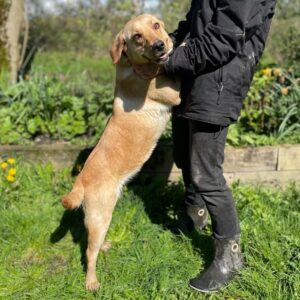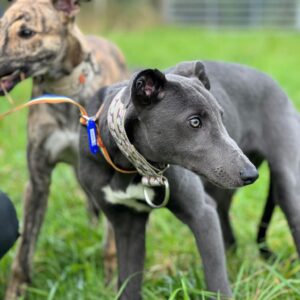Its important to note and take heed that when you adopt a rescue dog into your home, their whole world has changed almost instantly. They may have had a quite a rough start in life, they could have been abandoned or been tossed from pillar to post for some time before they’ve found their forever home with you. Dogs are wonderful, sensitive souls and a lot of change, particularly in their early life stages can affect them in all sorts of ways. They may be wary of new places or new sounds and scents, they may come with some social or separation anxiety issues that they will need help with to build their confidence. They may have missed out on early training and need guidance and some work. The absolute essential thing all rescue dogs and puppies in their new homes need is patience and understanding.
Settling a rescue dog in their new home

Sadly, in dog rescue, it is not uncommon for newly adopted dogs to be returned after just a few days in a new home. They’ll be returned under reasons like “they’re just not settling” or “they messed in the house”. The truth is that the first few days for a rescue dog in their new home can be so
overwhelming for both the family and dog alike. There can be a lot of excitement when first taking home a new family addition for people and dogs alike.The first three to five days for a rescue dog in their new home:
Rescue dogs can be quite stressed in such a new place and can exhibit signs of feeling unsure, not able to feel comfortable in themselves, they may try and push boundaries or even not eat or drink. Each and every dog is unique in their own individual way and adjust to time in their new home over
time. The first few days should be made as quiet and peaceful as possible. Some time should be spent going for walks to quiet places, exploring their new surroundings and garden and having quiet time in a bed or crate. It can take a rescue dog up to three weeks to start to settle into a new home. Be sure to establish the day to day routine around your school and work schedules for play time, feeding time and walk time.Three to five weeks for a rescue dog in their new home
Personalities and characters will start to come out in a newly adopted rescue dog after the first three weeks. They will start to settle and become more comfortable. They will start to be comfortable in the daily routines and be more in tune with their people. You may start to see behavioural
traits on walks and in the home and you will be really getting a feel for your dog’s personality and building a bond with them. It is around this time that you can start taking them to the local dog park to meet buddies or a training class. All in all he will start to show signs of relaxing and settling in.Three to five months for a rescue dog in their new home
They will have started to feel completely comfortable and at ease in their new home. A true bond and trust will have formed with one if not all members of the family. They will be set in a routine and any behavioural issues that may arise will have been shown. This could nothing or a variety of
issues. Like humans, dogs have individual personalities and some behavioural habits can be formed that you may be able to work on yourself or need to get professional help from a reputable trainer. All dogs and their humans will benefit from some basic obedience training and commands to help manage your dog and maintain a strong bond with them. This will also help prevent any future negative habits from forming too.The best ways to help boost your rescue dog’s confidence
Establishing a set routine from early on and trying to commit to this going forward will help a rescue dog settle. Set meal and walk times will help structure this.
Unstructured play. Taking a ball out to the local park or garden or tossing a rope toy with your new dog will help to build their confidence and start a bond with them and you.
Provide quiet spaces in all the rooms of the house your dog has access to. This may in the form of a crate if your dog is crate trained or a cushy bed behind the sofa or door. This will help your dog feel secure while also being close to you.
Prioritise basic obedience training. As mentioned above, start to teach your dog basic commands. It might just be sit and stay at meal times or it might be recall on a long line for the first few weeks. Giving your dog general training will help strengthen the bond between you both and encourage him
to look to you for guidance going forward in new situations. A training class will be hugely beneficial here.Introduce confidence boosting games like brain training puzzles like lickimats or snuffle mats or give them their kibble in a kong to bat around the floor and work out how to get. Mental stimulation like this gives your dog a release of the happy hormone dopamine to their brain and keeps them
feeling happy and relaxed.



